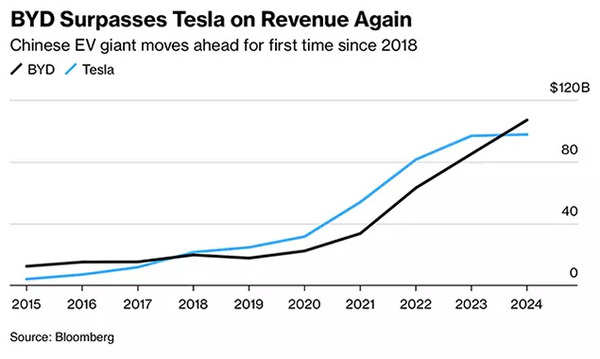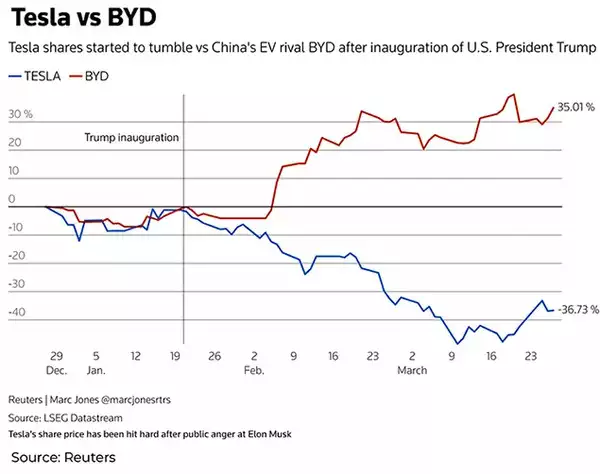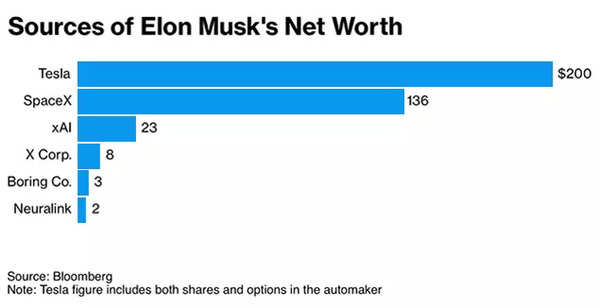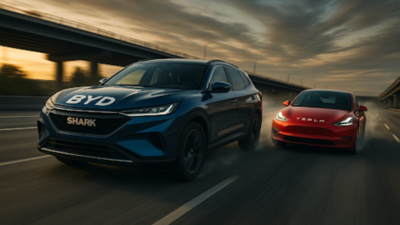US President Donald Trump’s sweeping 25% tariff on all imported vehicles and parts is a windfall for Elon Musk’s Tesla — at least on American soil. But it may prove meaningless against the rising global threat posed by China’s electric vehicle juggernaut, BYD.
Why it matters
- Tariffs may not stop BYD’s global takeover: Tesla may be protected in the US market, but China’s BYD — now the world’s top EV seller — is aggressively expanding into Europe, Southeast Asia, and Latin America, where Tesla is losing ground.
- Tesla’s international brand is under siege: Elon Musk’s close alignment with President Trump is fueling backlash abroad. From EU protests to Canadian subsidy cuts, Tesla is facing a reputational crisis that no tariff can fix.
- The China EV threat isn’t theoretical — it’s here: BYD’s latest innovations, like 5-minute ultra-fast charging and advanced hybrids, are reshaping consumer expectations. Tesla is no longer the undisputed tech leader in the electric vehicle race.
- Trump’s tariffs could backfire long-term: By disrupting the global EV supply chain — especially battery components from Japan and South Korea — the tariffs risk undermining the very infrastructure the US needs to compete with China.
- US consumers could take a financial hit: Goldman Sachs estimates the tariffs could raise car prices by $5,000 to $15,000. That narrows the price gap between Tesla EVs and cheaper gas-powered vehicles, threatening demand at home.
The big picture
In the US, Tesla is now the least exposed major carmaker to Trump’s new trade policy. The EV giant produces every car it sells in the US at massive factories in California and Texas. This domestic manufacturing footprint helps Musk sidestep the very tariffs that are clobbering rivals like GM, Toyota, and Hyundai, whose global supply chains cross numerous borders.
But this insulation only applies inside the US. Tesla’s real danger is coming from abroad, where BYD is moving ahead.
In late 2024, BYD leapfrogged Tesla in global EV sales and revenue, crossing the $100 billion mark. Backed early on by Warren Buffett and powered by aggressive tech innovation, BYD now poses the clearest threat Musk has ever faced. The company unveiled a new EV charging system that delivers 400 kilometers of range in just five minutes — an innovation Tesla has yet to match.


What they’re saying
As per a report in Asia Times, Elon Musk saw it coming. In early 2024, he warned that without tariffs, Chinese EV makers would “demolish” global rivals. “Chinese car companies are the most competitive car companies in the world,” he told shareholders. “If there are no trade barriers established, they will pretty much demolish most other car companies in the world.”
“Tesla a relative beneficiary given 100% US production footprint, substantial US sourcing and with Model Y competing in a midsize crossover segment where close to 50% of vehicles could be subject to tariffs,” TD Cowen’s Itay Michaeli told Asia Times.
Analysts are taking note. “Tesla is the least exposed auto giant,” says CFRA Research’s Garrett Nelson, citing the company’s US-based production and sourcing. Deutsche Bank agrees: “Tesla and Ford appear to be the most shielded from tariff impacts,” though Ford still faces risks from imported engines.
But even as Tesla enjoys short-term protection, Musk’s long-term problem is not going away — and it’s not just BYD. Chinese EV startups like XPeng, Nio, and Zeekr are rising fast, especially in emerging markets where cost matters more than brand identity, the Asia Times report said.
Long term I think Tesla stock’s going to do fine, so maybe it’s a buying opportunity.
Elon Musk
Between the lines
1. Tariffs hurt Tesla’s rivals far more than Tesla
The 25% tariff is expected to raise car prices in the US by $5,000 to $15,000 depending on the model, according to Goldman Sachs. That’s a sharp blow to companies like Hyundai and Toyota, which import a significant portion of their vehicles to the US despite also having American factories.
General Motors is also in the tariff crosshairs. Roughly 40% of GM’s US sales are from vehicles built in Mexico or Canada. GM also imports key models like the Equinox and Trax — meaning it will have to either absorb the cost or pass it to consumers.
European brands, especially Germany’s Volkswagen and Italy’s Stellantis, are even more exposed. These companies were betting on US growth to offset slumping sales in China — and Trump’s tariffs could derail that pivot.
2. Tesla’s political baggage is building
Musk’s role as head of Trump’s Department of Government Efficiency (DOGE) has sparked massive backlash. Protesters are now regularly demonstrating outside Tesla showrooms in the US and Europe, with signs comparing Musk to fascist leaders and labeling his vehicles “Swasticars.”
“Hey, hey, ho, ho, Elon Musk has got to go!” chanted several dozen protesters outside a Tesla showroom in Dublin, California—roughly 35 miles east of San Francisco—as a small group of Trump supporters stood across the street waving American flags, an AP report said.
In nearby Berkeley, a larger crowd surrounded another Tesla location, chanting to the rhythm of drums. “We’re living in a fascist state,” said Dennis Fagaly, a retired high school teacher from Oakland. “And we need to stop this or we’ll lose our whole country and everything that is good about the United States.”
In February alone, Tesla registrations in the EU dropped 47%. In New York, lawmakers are pushing to divest state pension funds from Tesla stock. In Canada, several provinces have pulled Tesla from EV rebate programs.
Tesla is in the middle of what one analyst called a “brand tornado crisis.” “This continues to be a moment of truth for Musk to navigate this brand tornado crisis moment and get onto the other side of this dark chapter for Tesla,” Wedbush Securities analyst Dan Ives wrote in a recent research note, said the AP report.
Tesla constitutes a large part of Musk’s wealth. It’s the Tesla that helped Musk become the world’s wealthiest person. But Musk runs the risk of losing a part of his fortune due to his political activism. Even Musk has admitted, “It’s costing me a lot to be in this job,” referencing the blowback from his Trump alliance and his role at DOGE.

3. China’s EV rise isn’t accidental
Trump may be loud about tariffs, but China has quietly mastered them for decades. As Michael Dunne explains, “China’s love affair with tariffs—quiet, almost clandestine—has been going on for decades.” Through a mix of heavy import taxes, limited licenses, and industrial policy, Beijing built an auto empire.
In 2024, China produced 31 million vehicles — three times more than the US. Despite being the world’s largest auto market, it has never allowed car imports to exceed 6% of the domestic market.
This fortress model is what allowed BYD and others to grow into global players. Now, they’re scaling internationally — exactly as Tesla begins to stumble.
What’s next
- Global dominance is slipping from Musk’s hands. Tesla is still a major force, but it’s no longer the inevitable EV champion. With Chinese competitors innovating faster and scaling cheaper, Musk’s global strategy needs a reboot.
- Trump’s tariffs are a double-edged sword. While they buy Tesla time in the US, they risk dismantling the global non-China EV supply chain — which includes Korean and Japanese battery makers essential to Tesla’s long-term competitiveness.
- BYD’s global march continues. Consumers can’t buy BYD vehicles in the US — yet. But elsewhere, they’re exploding. BYD has nailed pricing, design, and infrastructure.
- Tesla’s future isn’t guaranteed. Protectionism may offer short-term relief, but it won’t stop the global EV shift already underway. And in that race, China — not the US — is in the driver’s seat.
- Trade policy can shape short-term winners. But the bigger game—technological leadership, market share, and brand trust—is still very much in play.
- And in that game, Tesla is not the only player anymore. It may not even be the favorite.
(With inputs from agencies)




